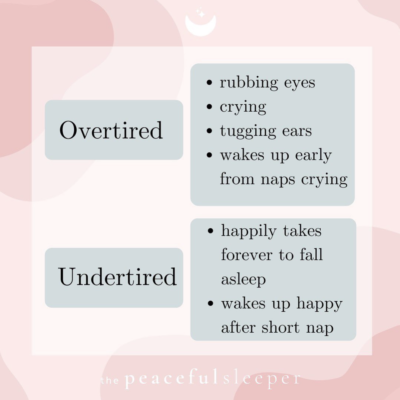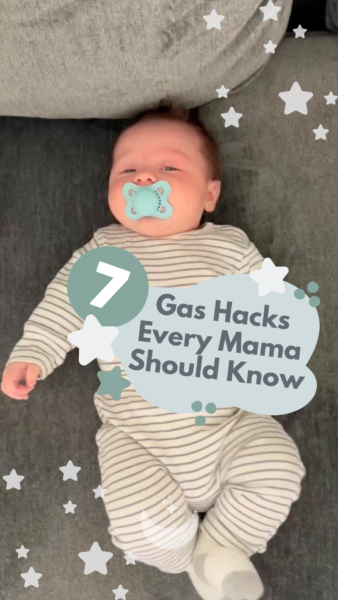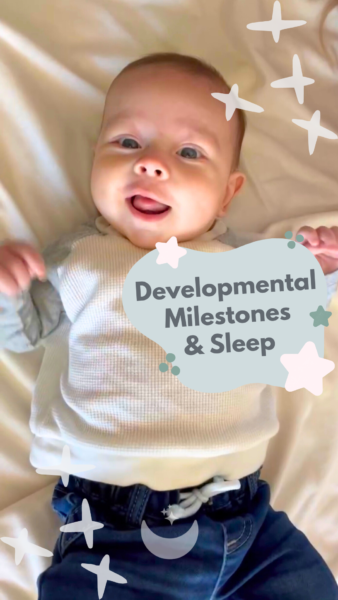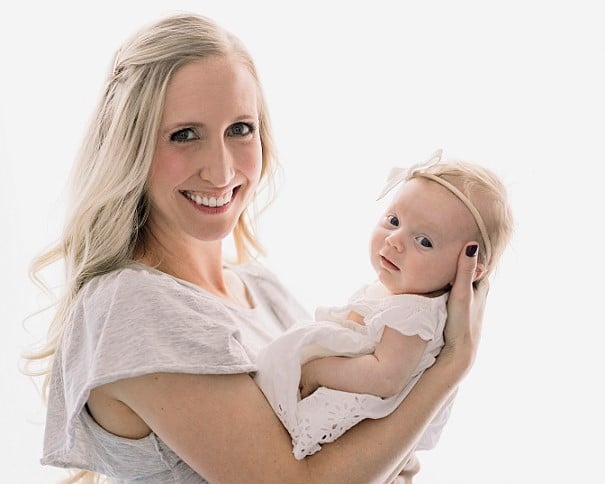I know how hard it is when your baby won’t sleep. I do. It’s why I do what I do! I remember all too well my own experiences after having my first – being sleep-deprived had me SO overwhelmed. Not to mention, it did nothing to help everything I was going through with postpartum anxiety and depression. The point is, this is my passion and I’m here to help!
In this blog post, I’m going to go over:
5 Potential Reasons Your Baby Won’t Sleep
How to Help Your Baby Get the Sleep They Need
Let’s get right to it!

5 Potential Reasons Your Baby Won’t Sleep
1. They Might Be Overtired
Here’s how overtiredness works…when little babies start to get tired, their bodies start to produce sleepy chemicals. If these sleepy chemicals start moving through their bodies but they don’t get to sleep, they start to power through and their bodies start producing chemicals to override the sleepy ones.
This leads to them being “wired and tired.” And it is sooooo much harder for them to settle once they are “wired and tired.” The key is to catch your baby BEFORE they become “wired and tired,” or when those sleepy chemicals start to flow. We do this by watching for sleepy cues…but more on that later.
Some signs of overtiredness include:
- Fussing
- Rubbing their eyes
- Tugging on their ears
- Arching their backs
- Flailing about
I have another blog post all about overtiredness and newborns.
2. They Might Be Undertired
If your baby won’t sleep because they are UNDERtired, it’s quite the opposite of them being overtired. It might look like this:
- Happily taking forever to fall asleep
- Waking up happy after a short nap
If this is the case, it might be time to drop a nap and/or push bedtime later.
Click here to check out this Overtired vs. Undertired Post on Instagram.
Or, read my blog post about overtired vs undertired here.
3. They Could Be Experiencing Discomfort
If you are following wake windows and watching for sleepy cues, the next thing we want to look into is ruling out tummy troubles. Tummy troubles are one of the things I find very often to be the culprit of babies having difficulty sleeping. Not to mention, it can be so heartbreaking when your baby is experiencing pain due to tummy troubles!
The typical culprit of tummy troubles and pain/discomfort is trapped gas. Here are 7 things you can do to help a gassy baby:
- Proper breastfeeding positions
- Use the correct bottle for gas and reflux
- Try different burping positions
- Try different positions to get out toots
- Check for a tongue tie and/or a lip tie
- Reevaluate your diet
- Rule out reflux
Click here to check out this post about 7 Gas Hacks Every Mom Should Know on Instagram.
4. They Might Be Heading Toward or in The Middle of a Sleep Regression
Sleep regressions can happen at any time and for a few different reasons like teething or illness. The best thing you can do in these situations is stay calm and keep moving forward with your baby’s sleep. Know that there are common ages for sleep regressions.
Here is a list (with other blog post links!) of the most common ages for sleep regressions:
- 6-8 week sleep regression
- 3 month sleep regression
- 4 month sleep regression
- 6 month sleep regression
- 8 month sleep regression
- 10 month sleep regression
- 12 month sleep regression
- 15 month sleep regression
- 18 month sleep regression
- 24 month sleep regression
5. They Could Be Hitting Developmental Milestones
Each and every developmental milestone (rolling, sitting up, crawling, etc.) is such an exciting time! The annoying part? Sleep is often disrupted. And this is totally normal!
Whatever the skill is that they’re working through, give them plenty of time during the day to work on it. If you find they’re up at night practicing their new skill instead of sleeping, just give them time and space to ride it out. The sooner they learn the new skill, the sooner they will be back to sleeping normally.
Click here to check out more about Developmental Milestones and Sleep on Instagram.
How to Help Your Baby Get the Sleep They Need
Follow Age-Appropriate Wake Windows and Watch for Sleepy Cues
The best way to determine the best time for your little one to sleep is to follow both age-appropriate wake windows AND watch for their sleepy cues.
Here are the average wake windows by age:
| Age | Number of Naps Per Day | Wake Window Between Naps | Wake Window Before Bed |
| 0-3 months | 4 – 7 | 60 – 90 min | 1 – 2 hours |
| 4 months | 4 | 90 min | 2 hours |
| 5 months | 3 | 2 hours | 2.5 hours |
| 7 months | 2 | 2-3 hours | 4 hours |
| 14 months | 1 | 5 hours | 5 hours |
Sleepy cues are the signals your baby gives that their bodies are ready for sleep. Think things like:
- Calm, still demeanor
- Eyes staring off into the distance
- Subtle yawns
- Reddish hue on eyebrows and eyelids

Optimize Their Sleep Environment
Having an optimal sleep environment plays a HUGE role in getting great baby sleep. If you aren’t already, here are a few things to consider adding to your little one’s sleep space:
- Dark environment (blackout curtains are key!)
- Sound Machine
- Cool room temperature (68 – 71ºF/20 – 22ºC is ideal)
- Separate sleep space (this could be their own room, or even a sectioned off space in your room)
Start The Sleep Learning Process
“Sleep Learning” is the process of teaching your baby the skills they need to fall asleep independently. It is working with your baby, in their zone of proximal development, and gradually releasing your support at a pace that works for BOTH of you.
In the 4-24 Months Content Library, you will learn how to be tuned in, consistent, and responsive to your baby’s specific needs while helping them develop sleep skills that will benefit them for the rest of their life! It includes 40+ video courses and 30 PDF guilds for troubleshooting common sleep challenges, all to help teach your baby to fall (and stay) asleep independently…AND lifetime access to all of it!
What We Can Do To Help
Having a sleep expert in your corner to support you wherever you are in your baby’s sleep journey makes the biggest difference. The truth is, your baby’s sleep situations and needs are unique…your support should be too!
From a quick phone consultation for troubleshooting general sleep issues to full on in-home support with daily follow-ups and concierge service – we’ve got you! Did you know you can also build a custom package? Click here to schedule a time to chat about your baby’s sleep situation and we can work together to build a custom plan that works for the whole family.

Recap On What To Do If Your Baby Won’t Sleep
As hard as it is when our babies won’t sleep, there are things we can do to optimize their sleep during the newborn stage and with sleep learning once they are 4 months or older. I promise that this won’t last forever! Hang in there and know that you can ask for the help you need.
And we are here to help you, no matter what your baby’s sleep situation is. I have a team of AMAZING certified pediatric sleep consultants all around the country who can be in your corner supporting you through your unique sleep situation. Click here to grab a consultation with one of them!
Whether your little one is a newborn (0-4 Months Content Library), 4-24 months (4-24 Months Content Library), or a toddler (2-5 Years Content Library), we have the resources you need to get your family the sleep you all deserve!






0 Comments